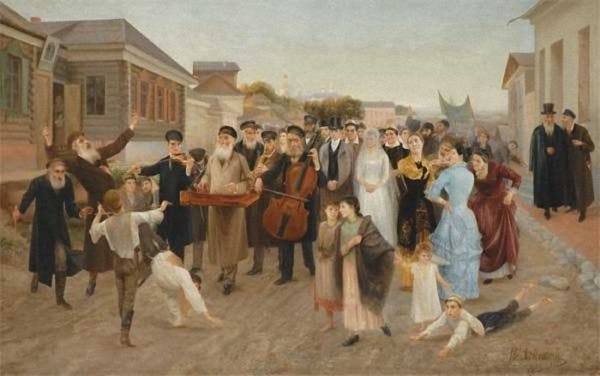Comedy as a Weapon for Survival Pt. II
A look at the history of Jewish humor through YIVO's class, "Is Anything Okay?"
This is a three-part series based on the YIVO Institute for Jewish Research’s free, online class called “Is Anything Okay?”. To catch up on the laughs, read part one here.
Last time, we learned about silly Jewish traditions of old, like stories from the Torah and Talmud, and the badkhn, or the wedding jester. Now, let’s get serious and talk about the hardships of shtetl life, and then get silly again. We’ll also learn why the Jews had to be so humorous (Hint: it’s in the title of this post).
But first, here’s a joke about Chelm, a Polish shtetl famously known as “The Town of Fools” and often served as the brunt of jokes, like:
A fire broke out one night in the city of Chelm and all the inhabitants rushed to the fiercely burning building to extinguish the blaze. When the conflagration had been put out, the rabbi mounted a table and addressed the citizens:
“My friends, this fire was a miracle sent from heaven above.”
There were murmurs of surprise in the crowd, and the rabbi hastened to explain.
“Look at it this way,” he said. “If it were not for the bright flames, how would we have been able to see how to put the fire out on such a dark night?”
Sharp Wit in the Shtetl
Shtetl life was marked by relentless hardship, from poverty to pogroms. Despite these hardships, or because of them, humor emerged as a powerful tool to cope with the bleakness and maintain a sense of community and hope. It was a unique kind of humor, sharp and self-deprecating, often tinged with a bittersweet awareness of life's absurdities.
The parody was a popular form of humor during this time. One of the earliest known parodies to appear in Eastern Europe was the Sefer ha-kundes (Book of the Prankster; 1824) from Vilna, a comic manual for pranks based on the style of the Shulḥan ‘arukh—a code of Jewish law.
Parody was used for religious change, whether it served as a campaign against Hasidism, like during the Haskalah (the “Jewish Enlightenment”) in the early 19th century, or for social change.
One example of using parody for social change was a siddur by Yitsḥak Kaminer, which used parody to address issues like the korobka (kosher meat tax), Jewish education, and literature. Parody made fun of things in the hope of reforming them, like a Yiddish version of The Onion.
"Blessed are You, Lord our God, King of the Universe, who brings forth the korobka from our pockets, and ensures our meat is holy, but our wallets are wholly empty."
"Blessed are You, Lord our God, who enlightens the hearts and minds of humanity, except when it comes to our literature, which remains as dry as the matzo at Passover."
Joke Books and More Jokes
Many joke books were created in the 19th century. The first Jewish joke book was written in 1810 by Rabbi Lippmann Moses Büschenthal. There are over 500 Yiddish joke books and books of funny stories published from the 1820s through the late 20th century in YIVO’s collections alone. In addition to joke books, there were Yiddish publications like Kol Mevasser, the first in the Pale of Settlement, that featured jokes.
Here’s more jokes!
One night a poor boy went to see a rich businessman, looking for a donation. “What is the meaning of this, coming to my house at night?” demanded the businessman angrily. “I beg your pardon,” the boy answered, “I do this during the day, too.”
(My personal favorite, of the dark variety): A gentile woman in a shetl of days of old was murdered. The community was worried because they knew the Jews were going to be blamed. So they gathered at the synagogue to plan on how they were going to get out of this. The rabbi comes in running and says, “Good news! It turns out the murdered woman was Jewish!” and everyone was relieved.
A sign on a church says, “Convert and we’ll give you $20.” Two jews are standing outside. One decides to go in and convert. When he comes out, the other guy asks him, “Did you do it? Did you convert? Did you get the money?” to which the other, the one who converted, replies: “You people are always about money.”
Jewish Jokes with Fred
Jumping ahead in time a bit… during Covid, I made Zoom videos with my (then) 90-year-old father. Coincidentally, our series on Jewish jokes is also in three parts. Here is part II, with some jokes and some history from . Enjoy!
Gut Shabbes,



Hahahahahahahahahahahahahahahahahahahah
Excellent way to start the day - needed a few chuckles after the tragedy last night (political one). Your dad hahaha - 20% off hahahaha
The funny stuff never ends. Here is a recent gag from Israel:
A third of Israelis work
A third of Israelis are in the IDF
A third of Israelis pay taxes.
Alas, they are all the same third.